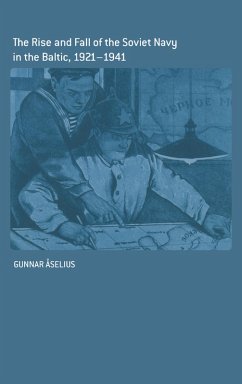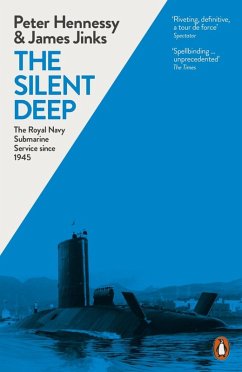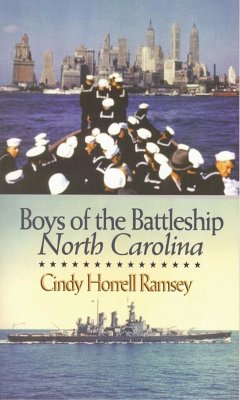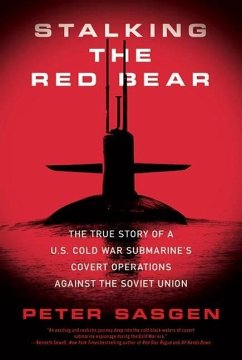
At Sea Against the Soviet Fleet (eBook, ePUB)
The Evolution of U.S. Navy Operational Intelligence in the Cold War
Versandkostenfrei!
Sofort per Download lieferbar
24,95 €
inkl. MwSt.
Weitere Ausgaben:

PAYBACK Punkte
12 °P sammeln!
At Sea Against the Soviet Fleet is a history of the evolution of the United States Navy's Operational Intelligence culture that informs great power competition with China today. At Sea Against the Soviet Fleet examines the critical transformation of naval intelligence during a pivotal era marked by the Cold War and the Vietnam conflict. Bryan Leese meticulously details how U.S. Navy operational intelligence evolved to meet the complexities of modern naval warfare, particularly in response to the increasing threats posed by the Soviet Navy. Structured into four main parts, this book begins by e...
At Sea Against the Soviet Fleet is a history of the evolution of the United States Navy's Operational Intelligence culture that informs great power competition with China today. At Sea Against the Soviet Fleet examines the critical transformation of naval intelligence during a pivotal era marked by the Cold War and the Vietnam conflict. Bryan Leese meticulously details how U.S. Navy operational intelligence evolved to meet the complexities of modern naval warfare, particularly in response to the increasing threats posed by the Soviet Navy. Structured into four main parts, this book begins by examining the Vietnam War and the institutionalization of shipboard operational intelligence, or what Navy intelligence calls Opintel. The book highlights the establishment of Integrated Operational Intelligence Centers as part of the RA-5C Vigilante program and the innovative strategies that emerged in air combat and targeting.
Leese goes on to underscore the necessity of Opintel to the U.S. Navy's close and distant blockade strategy in the 1960s and 1970s. He delves into the decentralization of intelligence processes, emphasizing the importance of adaptability and the need to prevent surprise attacks. This evolution is framed within the transition to the Navy's Ocean Surveillance Information System, a decentralized and responsive operational intelligence system. The ongoing developments of shipboard intelligence capabilities are explored, demonstrating how these advancements empowered naval commanders.
In the 1970s, the organizations evolved as the revolutionary Opintel adaptations of the 1960s that leveraged cooperation without hierarchy became formalized. Leese highlights the revolution to evolution process by introducing Opintel support to shipboard tactical decisions to integrate operational intelligence into comprehensive naval strategies. Capturing the essence of this transformative period, the author discusses the cultural dynamics within the Navy that fostered innovation and interdepartmental collaboration. These developments not only contributed to maintaining a strategic edge over the Soviet Union, but also laid the groundwork for future naval operations in the digital age.
Leese's work reveals the intricate interplay between technology, strategy, and personnel in creating an effective intelligence framework that allows the U.S. Navy to assert influence at sea, setting conditions for sea control in conflict. By blending rich archival research with firsthand accounts, this book offers a nuanced understanding of how the Navy adapted to an ever-changing operational landscape, ultimately preserving peace while navigating the complexities of high-stakes maritime conflict.
Leese goes on to underscore the necessity of Opintel to the U.S. Navy's close and distant blockade strategy in the 1960s and 1970s. He delves into the decentralization of intelligence processes, emphasizing the importance of adaptability and the need to prevent surprise attacks. This evolution is framed within the transition to the Navy's Ocean Surveillance Information System, a decentralized and responsive operational intelligence system. The ongoing developments of shipboard intelligence capabilities are explored, demonstrating how these advancements empowered naval commanders.
In the 1970s, the organizations evolved as the revolutionary Opintel adaptations of the 1960s that leveraged cooperation without hierarchy became formalized. Leese highlights the revolution to evolution process by introducing Opintel support to shipboard tactical decisions to integrate operational intelligence into comprehensive naval strategies. Capturing the essence of this transformative period, the author discusses the cultural dynamics within the Navy that fostered innovation and interdepartmental collaboration. These developments not only contributed to maintaining a strategic edge over the Soviet Union, but also laid the groundwork for future naval operations in the digital age.
Leese's work reveals the intricate interplay between technology, strategy, and personnel in creating an effective intelligence framework that allows the U.S. Navy to assert influence at sea, setting conditions for sea control in conflict. By blending rich archival research with firsthand accounts, this book offers a nuanced understanding of how the Navy adapted to an ever-changing operational landscape, ultimately preserving peace while navigating the complexities of high-stakes maritime conflict.
Dieser Download kann aus rechtlichen Gründen nur mit Rechnungsadresse in A, D ausgeliefert werden.













